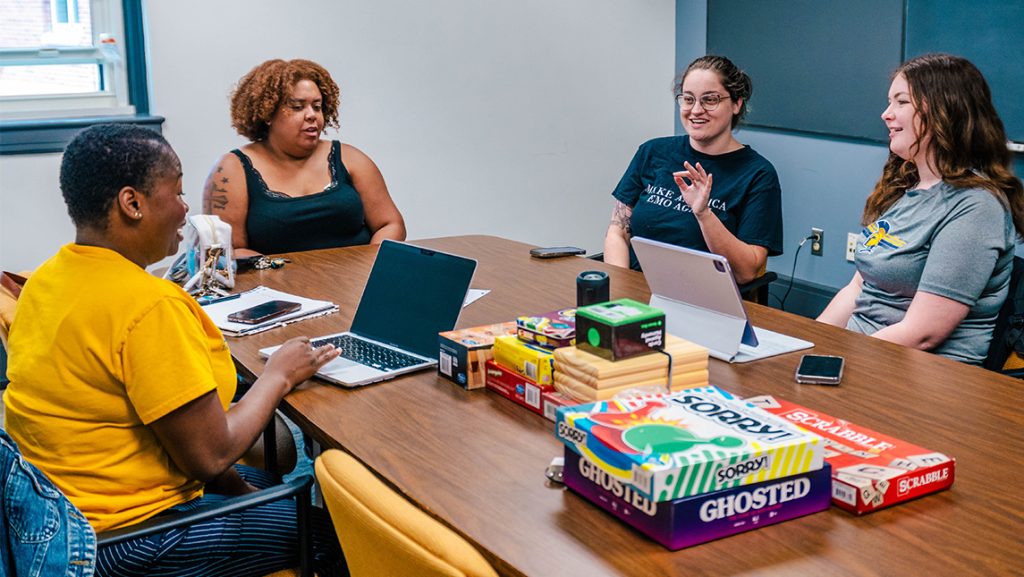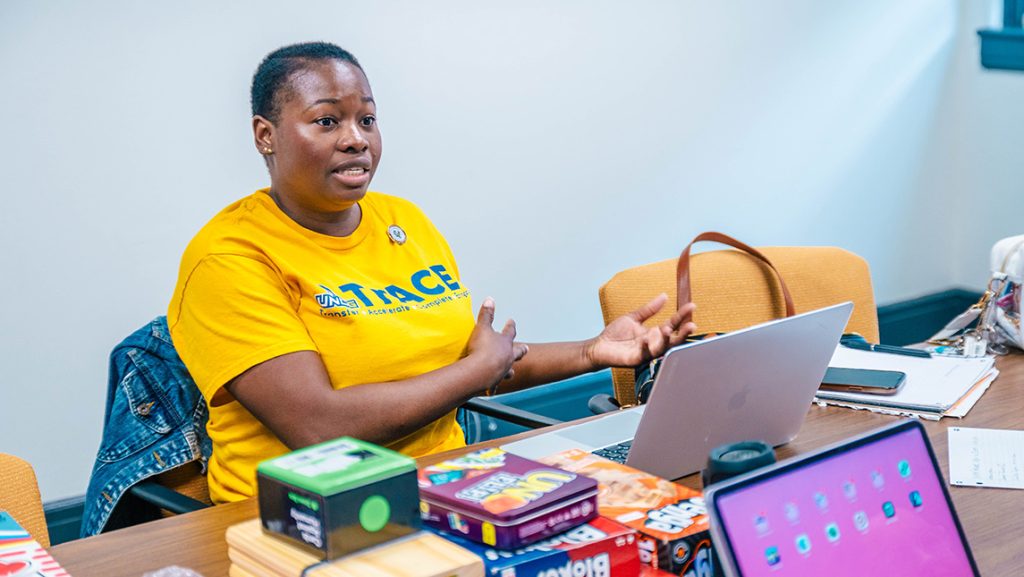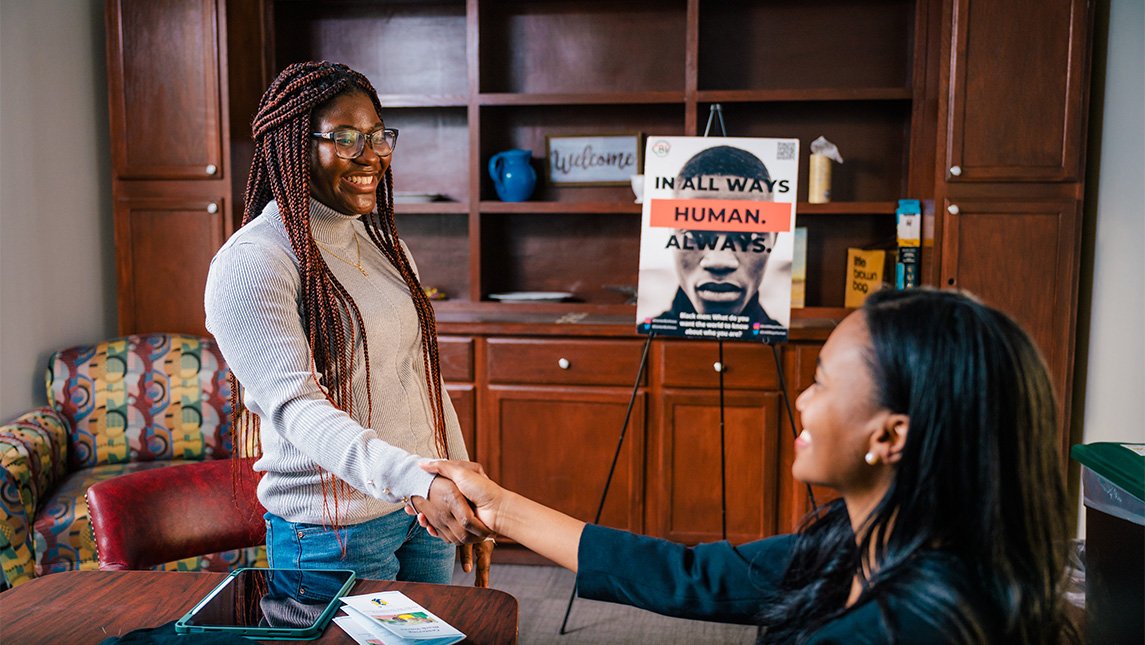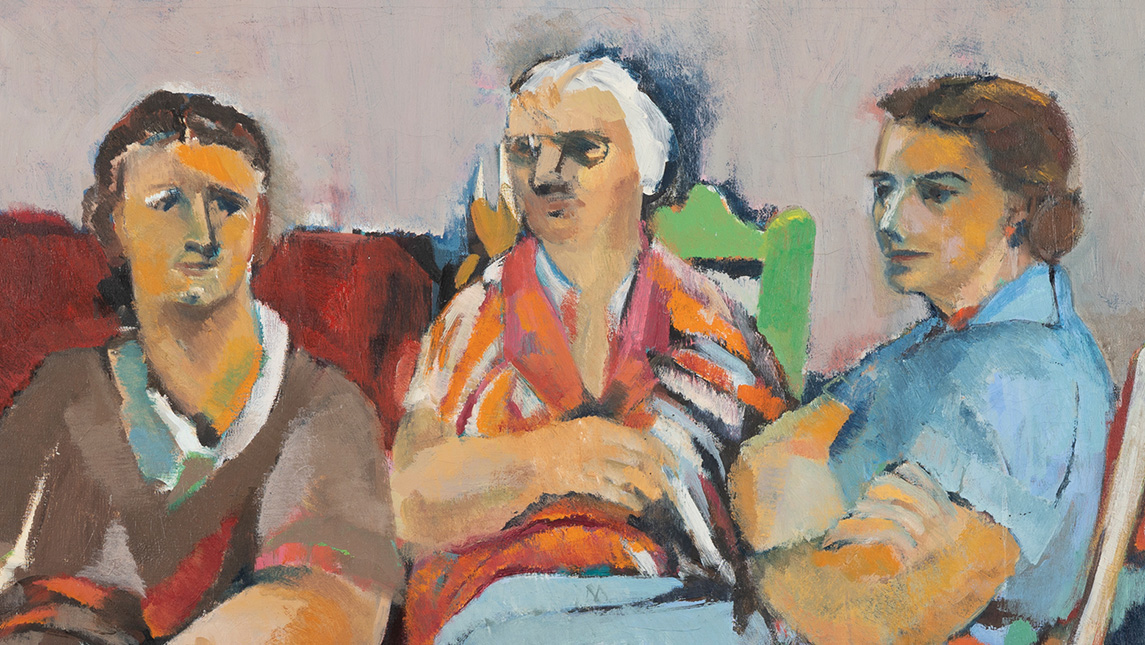As a mother and a U.S. Army veteran, Natalie Paul is used to people depending on her. But her childhood experiences have inspired her to step up for another group needing someone to depend on.
What started as a research project for a class at UNC Greensboro grew into a new organization helping a set of students who are – far too often – left to slip through the cracks.
“I’ve been connecting with other students who, like me, experienced aging out of foster care,” says Paul. “We’re all very excited and passionate to have this space on campus.”
That space Paul created is Foster Forward, where UNCG students who have aged out of the foster care system or are about to can lean on each other and share ideas for navigating the demands of college life.
Filling a Gap in Research
Paul, a double major in African American and Diaspora Studies (AADS) and Human Development and Family Studies (HDFS), says Foster Forward sprung from her honors thesis research. While taking HDFS Professor Andrea Hunter’s Family Diversity course, Paul began to study the residual impacts of foster care across the lifespan and identify gaps in existing research that leave older foster care alumni underrepresented.
“I noticed that the current body of research primarily focuses on the ages 26 and under, the initial period of transitioning out of foster care,” says Paul. “There’s not as much support in place for adult learners, say, someone who returns to school after the age of 26, someone like me who’s 34 and continuing their education.”
Dr. Hunter, who is also the Chancellor’s Fellow for Campus Climate at UNCG, became a faculty mentor to Paul. Together, they are going through memoirs and biographies of adults who aged out of foster care. The lack of a support system has been eye-opening.
“What I saw as very prevalent in my research was that unless they’re in an intimate relationship, they don’t have familial bonds or connections,” Paul says.



Paul’s research drew on sources like NPR’s “When Foster Kids Become Adults” and an analysis of extended care programs enacted by law in 1999, 2008, and 2010. One requirement for her honors thesis was to create a policy reform proposal. She crafted one centered on the David Brooks’ Weavers Project, aimed at creating a sense of home for all foster care alumni – a space where they belong, no matter where they are in life. “My recommendations emphasized community and permanency over a sole focus on self-sufficiency and independence,” she says.
She leaned on the many faculty members she had met through the AADS and HDFS programs, the McNair Scholars program, and Lloyd Honors International College. With the help of Dr. Hewan Girma, director of undergraduate studies in AADS, she received an Honors College Dean’s Award for summer research to further her investigation into the mental health of adult transnational adoptees.
Paul’s research got the attention of AADS Director Noelle Morrissette, who encouraged her to use her experiences to amplify the voices of others. Morrissette offered guidance on how to start a new student organization where she could apply the lessons of her research and help other Spartans.
A New Network of Care
One of Paul’s biggest goals for Foster Forward is developing peer mentorships. She started one with Foster Forward member Summer Ranson.
“We hope we can model that peer mentor relationship,” says Paul. “As someone who aged out of foster care, I hope that I can show her what that looks like as she’s undertaking her educational journey.”
Another goal is building relationships with community organizations who can offer housing assistance or financial literacy programs. Honors College Dean Omar Ali connected her to a youth ambassador for Youth Village. “She’s coming on board to teach us about the landscape of North Carolina, since I’ve only been here a couple years,” Paul says.
In May, National Foster Care Awareness Month, she will host an Outreach Day to share the results of her research and share resources available to students. Each semester, Paul hopes Foster Forward’s alumni can add to the support network. “The life skills requirements are so different for young people who are transitioning out, either into the work field or into the college space. I think it needs to be personalized in that way.”


Paul also took part in the McNair Summer Research Institute to expand on the work she had completed in the Family Diversity course, culminating in a full policy analysis that she presented at the 2024 McNair SAEOPP Symposium.
Paul appreciates how much faculty and staff from all areas of campus invested in her work. Their help was critical for her to accomplish so much while taking five classes, raising her daughter, and mentoring Ranson, all while interning with AADS as the department’s Mellon Multivocal Humanities Outreach Coordinator.
“I wear many different hats,” says Paul. “The theme of these last couple semesters has been community and solidifying a network where people can come and just be themselves, to have a space where they can connect with other people.”
Strength in Vulnerability
Paul draws wisdom not just from her research, but from her own experience. She previously served on Rhode Island’s youth advocacy board “The Voice.” One of her proudest achievements was helping create a Siblings Bill of Rights that was adopted by all six New England states.
There was another experience that taught her a life lesson she wants to pass on to others. Growing up, Paul says, it was hard to show vulnerability. That changed when she suffered an injury in the Army. “My entire life, I had to be strong. I had to figure it out. I had to always keep pushing forward. It wasn’t until that happened that I started asking for help.”
Through Foster Forward, she’s teaching others that it’s okay to ask for help. It’s something she wants to model for her own daughter. She says, “Sometimes, we look at vulnerability as a weakness, but really, when we open up and allow people to come in, that’s when we’re able to become the best version of ourselves.”
Story by Janet Imrick, University Communications
Photography by Sean Norona, University Communications








